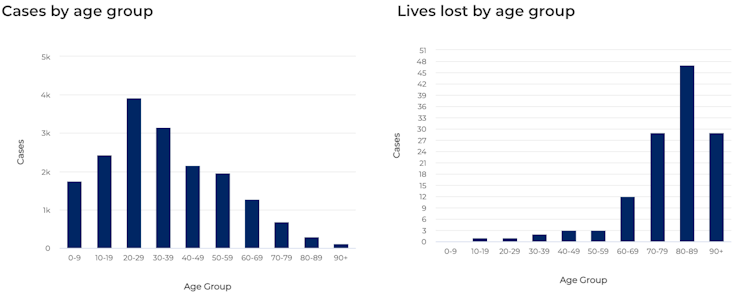High priority: why we must vaccinate children aged 12 and over now
- Written by Emma McBryde, Professor of Infectious Disease and Epidemiology, James Cook University
People aged 16 and above will soon be able to get a COVID vaccine in Australia, but this begs the question: what about children in younger age groups?
Currently, only 12-15 year olds with underlying medical conditions, Aboriginal and Torres Strait Islander children, and those living in remote communities are eligible.
Modelling by the Doherty Institute has suggested vaccinating 12-15 year olds would not make a material difference to the COVID epidemic.
However, as a researcher with expertise on modelling infectious diseases, it’s my view children aged 12 and over must be vaccinated with high priority.
Children and transmission
A key concept you might have heard about is the reproduction number — the number of new cases per infectious case. For the Delta strain, this number could be as high as nine. In other words, if there were no lockdowns or other controls in place, each Delta infection could theoretically lead to as many as nine new infections.
The “effective reproduction number” is how many new cases you get per infectious case after public health measures such as lockdowns have been applied.
The Doherty modelling used a baseline effective reproduction number of 3.6 but acknowledges the effective reproduction number will be different from state to state. It can also change over time.
The effective reproduction numbers in NSW and Victoria are currently under two — but this figure could rise when lockdowns lift.
Modelling by colleagues and I shows that once the value of the effective reproduction number creeps up above four, all else being equal, children including those younger than 16 start to feature highly in transmission.
In other words, we need to vaccinate children aged 12 and above now, in preparation for a scenario when the effective reproduction number is much higher than it has been under lockdowns.
A reality check
In a scenario where children aged 12 and above are returning to school and moving around the community unvaccinated, could masks and social distancing be enough?
Well, perhaps in an ideal world. But many simply assume children will be able to socially distance and wear masks just like adults do. Parents may wish to reflect on that.
We also need to compare old assumptions about COVID and children with what we are now seeing in reality.
The original strain of COVID-19 appeared to spare children; they were less likely than older people to be infected in the first place. The Delta strain seems to have changed all that.
According to NSW Health’s factsheet on coronavirus disease in NSW, only one person under 20 has died due to COVID. However, people in this age group are showing up significantly in overall case numbers.
Since NSW began its current lockdown, about one third of new COVID cases in NSW (around 3,000) have been in under 20 year olds.
 According to NSW Health, only one person under 20 has died due to COVID but people in this age group are showing up significantly in overall case numbers.
NSW Health
According to NSW Health, only one person under 20 has died due to COVID but people in this age group are showing up significantly in overall case numbers.
NSW Health
Victoria’s chief health officer has also noted childcare centres and schools feature heavily among the hotspots in that state.
If Delta does end up infecting children more than the original strain did, children may become the super-spreaders of the Delta variant — just as they are key transmitters of influenza, pertussis, measles, chicken pox and just about every respiratory virus.
Now, some expert groups — including modellers — are starting to call for younger children to be vaccinated with high priority.
Read more: Should we vaccinate children against COVID-19? We asked 5 experts
Which vaccine? While Pfizer is scarce, we should direct it to younger people
While Pfizer is scarce, we should be providing Pfizer to the younger population (who are more likely to transmit COVID-19), while giving AstraZeneca to older people.
While both vaccines are over 90% effective at reducing death and severe outcomes from COVID (including Delta), Pfizer is better than AstraZeneca at reducing transmission of the virus.
In Australia, children 12-17 are approved to receive Pfizer but not AstraZeneca.
What are the consequences of not vaccinating younger children?
The risks of not vaccinating children in the 12+ age group include:
more children becoming sick with COVID
denying children potential freedoms that may come with vaccination, such as returning to school, travel or avoiding strict lockdowns
not vaccinating children means living with the knowledge we haven’t done everything possible to ensure they don’t transmit COVID to more vulnerable people.
It’s unlikely Australia will achieve herd immunity to COVID this year.
But even without herd immunity, every little bit helps — and the growing number of cases in younger children suggests we need to vaccinate this group sooner, rather than later.
Authors: Emma McBryde, Professor of Infectious Disease and Epidemiology, James Cook University
Read more https://theconversation.com/high-priority-why-we-must-vaccinate-children-aged-12-and-over-now-166425




